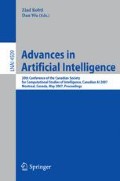Abstract
We have constructed a poker classification system which makes informed betting decisions based upon three defining features extracted while playing poker: hand value, risk, and aggressiveness. The system is implemented as a player-agent, therefore the goals of the classifier are not only to correctly determine whether each hand should be folded, called, or raised, but to win as many chips as possible from the other players. The decision space is found by evolutionary methods, starting from a data-driven initial state. Our results showed that evolving an agent from a data-driven “head-start” position resulted in the best performance over agents evolved from scratch, data-driven agents, random agents, and “always fold” agents.
Access this chapter
Tax calculation will be finalised at checkout
Purchases are for personal use only
Preview
Unable to display preview. Download preview PDF.
References
Billings, D., Davidson, A., Schaeffer, J., Szafron, D.: The challenge of poker. Artificial Intelligence 134(1-2), 201–240 (2002)
Billings, D., Burch, N., Davidson, A., Holte, R., Schaeffer, J., Schauenberg, T., Szafron, D.: Approximating game theoretic optimal strategies for full-scale poker. In: International Joint Conference on Artificial Intelligence, August 2003, pp. 661–668 (2003)
Blank, T., Soh, L.K., Scott, S.: Creating an svm to play strong poker. In: International Conference on Machine Learning and Applications, December 2004, pp. 150–155 (2004)
Oliehoek, F.A., Vlassis, N., de Jong, E.D.: Coevolutionary nash in poker games. In: 17th Belgian-Dutch Conference on Artificial Intelligence, October 2005, pp. 188–193 (2005)
Southey, F., Bowling, M., Larson, B., Piccione, C., Burch, N., Billings, D., Rayner, C.: Bayes’ bluff: Opponent modelling in poker. In: Twenty-First Conference on Uncertainty in Artificial Intelligence, July 2005, pp. 550–558 (2005)
Duda, R.O., Hart, P.E., Stork, D.G.: Pattern Classification. Wiley Interscience, Hoboken (2000)
Author information
Authors and Affiliations
Editor information
Rights and permissions
Copyright information
© 2007 Springer Berlin Heidelberg
About this paper
Cite this paper
Beattie, B., Nicolai, G., Gerhard, D., Hilderman, R.J. (2007). Pattern Classification in No-Limit Poker: A Head-Start Evolutionary Approach. In: Kobti, Z., Wu, D. (eds) Advances in Artificial Intelligence. Canadian AI 2007. Lecture Notes in Computer Science(), vol 4509. Springer, Berlin, Heidelberg. https://doi.org/10.1007/978-3-540-72665-4_18
Download citation
DOI: https://doi.org/10.1007/978-3-540-72665-4_18
Publisher Name: Springer, Berlin, Heidelberg
Print ISBN: 978-3-540-72664-7
Online ISBN: 978-3-540-72665-4
eBook Packages: Computer ScienceComputer Science (R0)

